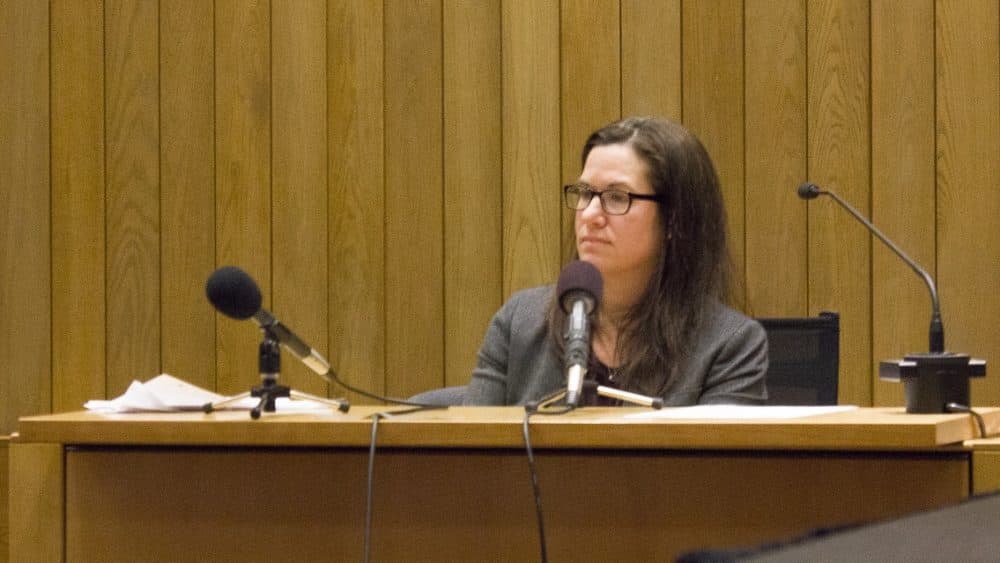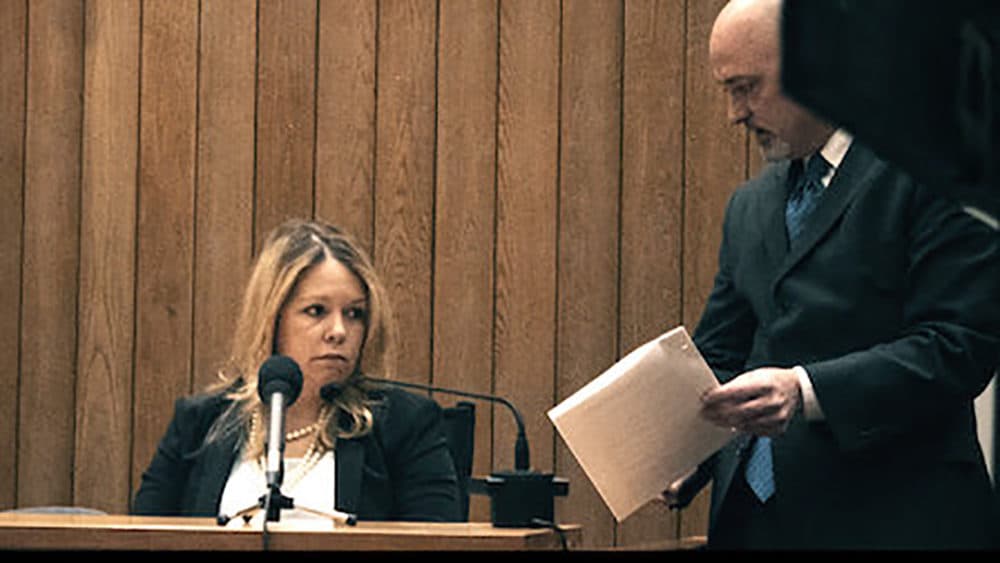Advertisement
Lawyers On Both Sides Recommend Sanctions For 3 Ex-Assistant AGs In Drug Lab Scandal
The question of whether, and how, three former Massachusetts assistant attorneys general will be punished by the state board that oversees lawyer misconduct is closer to being answered. The former prosecutors stand accused of withholding potential exculpatory evidence in one of the state's drug lab fiascoes.
Lawyers for Kris Foster, Anne Kaczmarek and John Verner recommended their clients face some sanctions for their roles in the highly-publicized scandal, including public reprimands or even short-term suspensions of their law licenses.
But, the prosecutor of the trio of former prosecutors — the Bar Counsel for the Massachusetts Board of Bar Overseers — asked for tougher punishments, including disbarment for Kaczmarek.
For Foster and Verner, Bar Counsel suggested their law licenses be suspended long enough that they would be forced to apply for reinstatement.
The disciplinary recommendations were filed last week with the Board of Bar Overseers. The BBO, which reviews complaints of attorney misconduct, will determine if the former assistant attorneys general will face sanctions.
Arguments For Severe Or Gentler Punishments
After weeks of hearings held late last year, a BBO Special Hearing Officer (SHO) found Foster, Kaczmarek and Verner each played a role in withholding information that indicated drug evidence was potentially compromised in thousands of criminal cases handled by the state-run lab in Amherst.
The potentially exculpatory evidence revolved around the actions of former state chemist Sonja Farak, who was convicted in 2014 of stealing and consuming drug samples she was supposed to be testing at the Amherst lab. Farak served 18 months in prison. Thousands of drug convictions were vacated because of her misconduct.
"Scapegoating one or all of the respondents can only detract from the ultimate goals of those who seek justice for those who were unjustly accused or prosecuted," wrote Thomas Kiley, an attorney with the firm CEK Boston, representing Kaczmarek, in his recommendations for sanctions.
At most, Kiley said, Kaczmarek should be punished with a suspension of her law license for less than one year.
Advertisement
Kiley wrote that Kaczmarek was focused on prosecuting Farak during her time in the AG's office, and there was no deliberate attempt to withhold evidence from district attorneys who had prosecuted drug cases based on Farak's testing.
Leadership at the AG's office at the time was at fault, Kiley wrote, citing that the office was dealing with an almost simultaneous and similar scandal at another state drug lab in Boston. In 2013, former state chemist Annie Dookhan was convicted after admitting to falsifying evidence and tampering with drug samples at the Hinton Lab. Tens of thousands of criminal cases were dismissed because of Dookhan's misconduct.
"In the Farak case, as in the military, sh-- flows downhill, but responsibility lies at the top," Kiley's response reads. "Harsh sanctions imposed on three Respondents, two of whom were line prosecutors with no supervisory or policy-making power, would obscure if not erase, the significance of the institutional failure."
Much of the report from BBO Special Hearing Officer Alan Rose was critical of Kaczmarek, saying she "actively misled" her colleagues and that he did not find some of her testimony credible. During the disciplinary hearings before Rose, Kaczmarek testified that she thought the evidence had been turned over and the fact that it hadn't was a mistake, not an attempt to minimize the extent of Farak's misconduct.
Bar Counsel recommended Kaczmarek be disbarred.

"The disciplinary hearing established that Kaczmarek was the principal actor in the
unprecedented prosecutorial misconduct that tarnished the reputation of criminal prosecutors and undermined the integrity of the Massachusetts criminal justice system," wrote Assistant Bar Counsel Joseph Makalusky. "It must be emphasized that this is not a case involving an innocent mistake by a prosecutor who neglected to disclose a single piece of evidence."
The key potentially exculpatory materials were so-called "mental health worksheets" that were found in a police search of Farak's car. Those worksheets showed that Farak's drug use apparently went on for much longer than the AG's office claimed, possibly compromising more of Farak's drug tests.
After lengthy legal wrangling, criminal defense attorney Luke Ryan discovered the mental health worksheets in evidence files kept inside the AG's office. The worksheets had not been turned over district attorneys who were to then supposed to provide them to the defense attorneys for those charged with crimes based on Farak's testing.
"It must be emphasized that this is not a case involving an innocent mistake by a prosecutor who neglected to disclose a single piece of evidence."
Assistant Bar Counsel Joseph Makalusky
As for John Verner, who led the AG's Criminal Bureau at the time under former state Attorney General Martha Coakley, Bar Counsel recommended his law license be suspended for one year and one day. That would require Verner to reapply to have his license reinstated.
"Such a sanction is necessary to deter other members of the bar from taking their supervisory responsibilities lightly, and to restore some measure of the public’s confidence in the integrity of the bar and the fairness and impartiality of our legal system," Makalusky wrote.
Verner's attorneys said sufficient punishment would be no more than a public reprimand.
Although Rose, the special hearing officer, found Verner was not diligent in supervising Kaczmarek and should have known that not all the Farak materials were disclosed, Verner's attorneys said there was not enough proof that Verner intentionally withheld potentially exculpatory evidence.
"Bar Counsel ultimately could not prove most of its case, which alleged a greater direct connection between Verner and the nondisclosure of exculpatory information than the facts found by the SHO revealed," wrote Verner's attorney, Patrick Hanley, with the firm Butters Brazilian LLP.
Verner's attorneys submitted dozens of letters on his behalf, including ones from former AG Coakley and Verner's current boss, Suffolk County District Attorney Rachael Rollins, who is in line to become the next Massachusetts U.S. Attorney.
"The Special Hearing Officer found that John failed to follow-up on a supervisee
and lacked diligence in 2013," Rollins wrote. "Some eight years later, in 2021, John is one of the most diligent and conscientious attorneys I have had the privilege of working with. He has humility and grace. None of us is our best or worst moment. I ask that you look at the mosaic of this man’s career and recognize that he has learned
from this situation."
Coakley's letter in support of Verner said she recognized that she was writing about something that happened during her tenure as state AG, and she was not commenting on "the facts of the case." But, Coakley wrote that she first hired Verner in 2000 when she was the Middlesex County district attorney and vouched for his character.
"One lesson that I learned from my predecessors in the DA and AG Offices and tried to instill in each office that I led, was that as prosecutors, we were bound to seek truth and fairness, not just pleas or convictions," Coakley wrote. "John shared that belief and still does."
Kris Foster's attorneys said that, according to American Bar Association standards, an appropriate punishment for Foster would be an admonition. They argued that Foster was new to her job in the AG's office, was just following the orders of her supervisors, including Kaczmarek and Verner, and believed all relevant evidence had been disclosed.
"Her superiors gave her an assignment and then failed to give her proper support and guidance," wrote Foster's attorney, Allen David, with the firm Peabody and Arnold LLP. "She accepts responsibility for her shortcomings, but, as has been found, she did not act intentionally.
"Had she had more experience, there is still no guarantee that the outcome would have been different," David continued. "As the SHO noted, she might have avoided the ensuing confusion, but it is not all obvious that the mental health worksheets would have been produced given Kaczmarek’s intentional concealment."
Rose found fault with the way Foster handled court hearings in western Massachusetts, where judges sought information from the AG about the extent of Farak's misconduct to determine how drug cases in their jurisdictions might be affected.
In 2017, Hampden Superior Court Judge Richard Carey concluded after those court hearings the Kaczmarek and Foster had committed "fraud upon the court" by not disclosing the potentially exculpatory materials.
In his assessment, Rose surmised that Foster should have been better prepared for those hearings and found that Foster "made repeated representations to the Court on critical issues without having any factual foundation."
Bar Counsel also recommended a one year and one day law license suspension for Foster.

"It is evident in the end that Foster’s misconduct was attributable not to inexperience, but to her failure to apply basic levels of diligence and competence," Makalusky wrote.
Debate Over Whether Publicity Was 'Informal Punishment'
Boston College law professor Nancy Kaufman said a one-year law license suspension is standard punishment for making false claims in court. She expects that a public reprimand would be the minimum sanction.
"The conduct here given the consequences and the impact on the administration of justice certainly seems to call for a public reprimand, at the very least," Kaufman said. "This case received a lot of publicity, and the public knows these three are being prosecuted."
Although it's rare for a prosecutor to face discipline, both sides cited how lawyers involved in similar cases have been punished. The attorneys for the three prosecutors pointed out so-called "mitigating" or "aggravating" factors which might reduce potential punishment. Among those factors, they said, was the publicity surrounding the drug lab scandals, including a Netflix documentary released last year.
"The conduct here given the consequences and the impact on the administration of justice certainly seems to call for a public reprimand, at the very least."
Nancy Kaufman, BC law professor
All three former assistant attorneys general already have been harmed by the publicity, their attorneys argued. The lawyers asked the BBO to consider how their clients' legal reputations have been affected by the media coverage of the scandals and the public disciplinary hearings.
Foster's attorneys said she already has been publicly reprimanded in the media and was not supported by higher ups in the AG's office. They said that for Foster, "further piling on is neither appropriate nor warranted."
"This delay and media attention have related impacts and render informal punishment," wrote Hanley, Verner's attorney. "The SHO should consider this informal punishment."
But Bar Counsel rejected that argument, saying that punishment is appropriate precisely because of the media attention.
"Respondents’ professional misconduct created the perception that prosecutors cannot be trusted, undermined confidence in the criminal justice system and harmed countless people," wrote Makalusky. "The news media has floodlighted this damage, and the glare has caught the attention of the public and the bar. With all eyes on these disciplinary proceedings, it becomes even more important to administer sanctions that deliver the appropriate responsive messages."
Legal observers say it will be difficult to determine punishment, because there aren't many other cases that have so profoundly affected the Massachusetts criminal justice system. Former BBO member Elizabeth N. Mulvey, founding partner in the firm Crowe & Mulvey, said the effects of the drug lab scandals ultimately may be a factor in how these attorneys are punished.
"It certainly makes intuitive sense that the overall impact on the justice system should be a factor in determining discipline," Mulvey said. "But off the top of my head I can't think of a real good analogy for something that has caused anything near this scope of harm."
To date, the Massachusetts attorney general’s office has spent about $1 million in legal fees to defend Kaczmarek, Verner and Foster.
The next step will be for Special Hearing Officer Rose to make his recommendations for sanctions, which are forwarded to the BBO for a vote. The state Supreme Judicial Court would then review the punishment.
